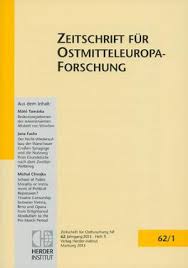Mähren als Exilland und Durchgangsstation. Kuttenberger Deutsche und deren Schicksal auf der Grundlage überlieferter Bürgertestamente (1421-1435)
Moravia as Exile Land and Transit Point. Kuttenberg Germans and their Fate on the Basis of Preserved Wills of Burghers (1421-1435)
Author(s): Thomas KrzenckSubject(s): Christian Theology and Religion, 15th Century, Migration Studies, Asylum, Refugees, Migration as Policy-fields
Published by: Verlag Herder-Institut
Keywords: last wills; Moravia; Kuttenberg (Kutná Hora); Iglau (Jihlava); expulsion; hussitism; town book; emigration;
Summary/Abstract: An important part of the Hussite Revolution in Bohemia, beginning with the first Prague defenestration in the summer of 1419, was the question of expulsion and emigration concerning catholic intellectuals from the Charles University, but also priests and monks outside of the capital. On the contrary the question of expulsion and emigration of catholic citizens during this time is a research topic, which is understudied in Czech and international historiography. An example par excellence in this context is that of Kuttenberg (Kutná Hora). Situated in the Central Bohemian region, it was the second largest town in medieval Bohemia and became an important centre for the kingdom because of the prosperous silver mining in the area; through this the town was able to compete with Prague economically, culturally and politically. Concerning the administration and the ethnic-national situation of Kuttenberg, until the beginning of the Hussite Revolution German inhabitants dominated public life. After the Battle of Kutná Hora in January 1422 many of them, families, men and women, had to leave their home, because the only chance to stay was to change their faith. About 100 people found exile in Moravia, especially in the catholic Iglau (Jihlava), where Germans also dominated economically and politically. An important source reflecting the situation of the catholic refugees from Kuttenberg in Iglau is the so-called Town Book Number Three, which contains last wills and other information about these emigrants from the period between 1421 and 1437. Written in Latin and German, the book presents their difficult economic situation and everyday life. Many of the refugees bequeathed houses in their hometown Kuttenberg to other people, ignoring the political situation there, hoping that the Hussite faith would find an end.
Journal: Zeitschrift für Ostmitteleuropa-Forschung
- Issue Year: 67/2018
- Issue No: 1
- Page Range: 1-31
- Page Count: 31
- Language: German

